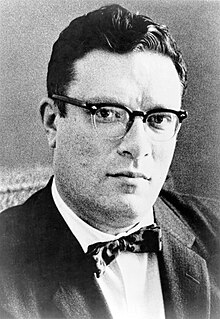Isaac Asimov
Isaac Asimov ( /ˈaɪzɪk ˈæzɪmɒv/ EYE-zək AZ-ə-mov;[2] abiso Isaak Yudovich Ozimov; Rọ́síà: Исаак Юдович Озимов; c. January 2, 1920[1] – April 6, 1992) je olukowe ati ojogbon ara Amerika ninu eko ipoogun-alaye ni Yunifasiti Boston, to gbajumo fun awon ise re ninu adako sayensi ati fun awon iwe sayensi agbajumo re.
| Isaac Asimov | |
|---|---|
 Asimov in 1965 | |
| Ọjọ́ ìbí | Isaak Yudovich Ozimov Between October 4, 1919 and January 2, 1920[1] Petrovichi, Russian SFSR |
| Ọjọ́ aláìsí | April 6, 1992 (ọmọ ọdún 72) New York City, USA |
| Iṣẹ́ | Writer, Professor of biochemistry |
| Ọmọ orílẹ̀-èdè | American |
| Ẹ̀kọ́ | Columbia University, PhD. Biochemistry, 1948 |
| Ìgbà | 1939–1992 |
| Genre | Science fiction (hard SF, social SF), mystery |
| Subject | Popular science, science textbooks, essays, literary criticism |
| Literary movement | Golden Age of Science Fiction |
| Notable works | The Foundation Series The Robot series Nightfall The Intelligent Man's Guide to Science I, Robot Planets for Man |
| Spouse | Gertrude Blugerman (1942-1973; divorced; 2 children) Janet Opal Jeppson (1973-1992; his death) |
| Signature |  |

|
Àyọkà yìí tàbí apá rẹ̀ únfẹ́ àtúnṣe sí. Ẹ le fẹ̀ jù báyìí lọ tàbí kí ẹ ṣàtúnṣe rẹ̀ lọ́nà tí yíò mu kúnrẹ́rẹ́. Ẹ ran Wikipedia lọ́wọ́ láti fẹ̀ẹ́ jù báyìí lọ. |
Itokasi
àtúnṣe- ↑ 1.0 1.1 Asimov, Isaac. In Memory Yet Green. "The date of my birth, as I celebrate it, was January 2, 1920. It could not have been later than that. It might, however, have been earlier. Allowing for the uncertainties of the times, of the lack of records, of the Jewish and Julian calendars, it might have been as early as October 4, 1919. There is, however, no way of finding out. My parents were always uncertain and it really doesn't matter. I celebrate January 2, 1920, so let it be."
- ↑ Pronunciation note: In the humorous poem "The Prime of Life" published in the anthology The Bicentennial Man and Other Stories, Asimov rhymes his name thusly: "Why, mazel tov, it's Asimov". In his comments to the poem Asimov wrote that originally it was "Why, stars above, it's Asimov", and when someone suggested to use "mazel tov" instead, Asimov accepted this as a significant improvement.